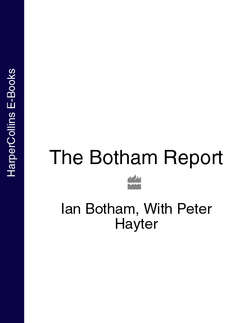Читать книгу The Botham Report - Ian Botham, Ian Botham - Страница 8
INTRODUCTION
Оглавление‘From the moment when England secured the Ashes back in 1987, it took ten years to persuade the men in charge of our game that change had to come. Ten years of complacency. Ten years of waste. Ten years of hurt.’
Winning the 1986–87 series against Australia down under should have created a platform from which England could seek to dominate world cricket for a decade.
Instead it might just have been the worst thing I and my colleagues could have done for the game in this country because the successes we achieved under Mike Gatting’s captaincy merely served to paper over the cracks.
The feeling created by our performances down under, that everything in the English garden was rosy, turned out to be an illusion. Complacency was allowed to set in and complacency is death.
Australia reacted to their defeat by setting out long-term, clearly-defined goals to revive their fortunes at international level. They had lost to the Poms just once too often for comfort, realised a plan needed to be devised and stuck to it. Their rise to the status of unofficial world champions demonstrates just how well they put their strategy into practice.
We, on the other, hand proceeded as usual merely to look from one Test match and one Test series to the next.
Indeed, it was not until Mike Atherton was appointed captain to succeed Graham Gooch in 1993 that any kind of long-term selection strategy came into play. Atherton was appointed with a mandate for change, carte blanche to pick young players for the 1993–94 tour to West Indies and let them develop individually and as a team, no matter what short-term setbacks they might suffer. How long did the plan last? Three Test matches. In came Raymond Illingworth as Chairman of Selectors and, over the next two seasons, back came Graham Gooch, Mike Gatting and John Emburey as players. There’s long-term strategy for you.
From the moment England secured the Ashes back in 1987, it took ten years to persuade the men in charge of our game that change had to come. Ten years of complacency. Ten years of waste. Ten years of hurt.
When I review the performances of the England team during the decade in question one thing is immediately obvious, namely the apparently huge difference in the level of the talent available to England as opposed to that emerging elsewhere.
To the naked eye, the difference in quality is startling. While a steady stream of competent batsmen and the occasional high-class act like Mike Atherton have emerged, England have failed to produce one consistent world-class Test bowler, pace, swing, seam or spin, for a decade. When you look around world cricket the difference between the top cricketing nations and England in this respect tells it own story.
Just ponder this list of world-class Test match winners operating during the period in question – Shane Warne, Merv Hughes, Terry Alderman, Wasim Akram, Waqar Younis, Mushtaq Ahmed, Curtly Ambrose, Courtney Walsh, Allan Donald and Anil Kumble – and compare them with the best England have had to offer.
But great players are made as well as born. It is clear that, for too long, England players have reached Test level in spite of our domestic system rather than because of it. Thank goodness Lord MacLaurin understands that success is not merely cyclical and that change is absolutely fundamental for the future well-being of cricket in this country. In Raising the Standard, his plan to take English cricket back to the world summit, all those measures he is seeking to implement below first-class level demonstrate his clear sightedness and vision and, given a late change of mood among the most reactionary clubs, at the time of writing the possibility existed that he might even be given a mandate for real change.
But my reflections on England’s struggles in the period 1987–1997 also concern the mistakes, the short-sightedness, the selfishness and the plain incompetence of those individuals who, despite all the constraints placed on them by the shortcomings of the county game, could and should have made a difference.
